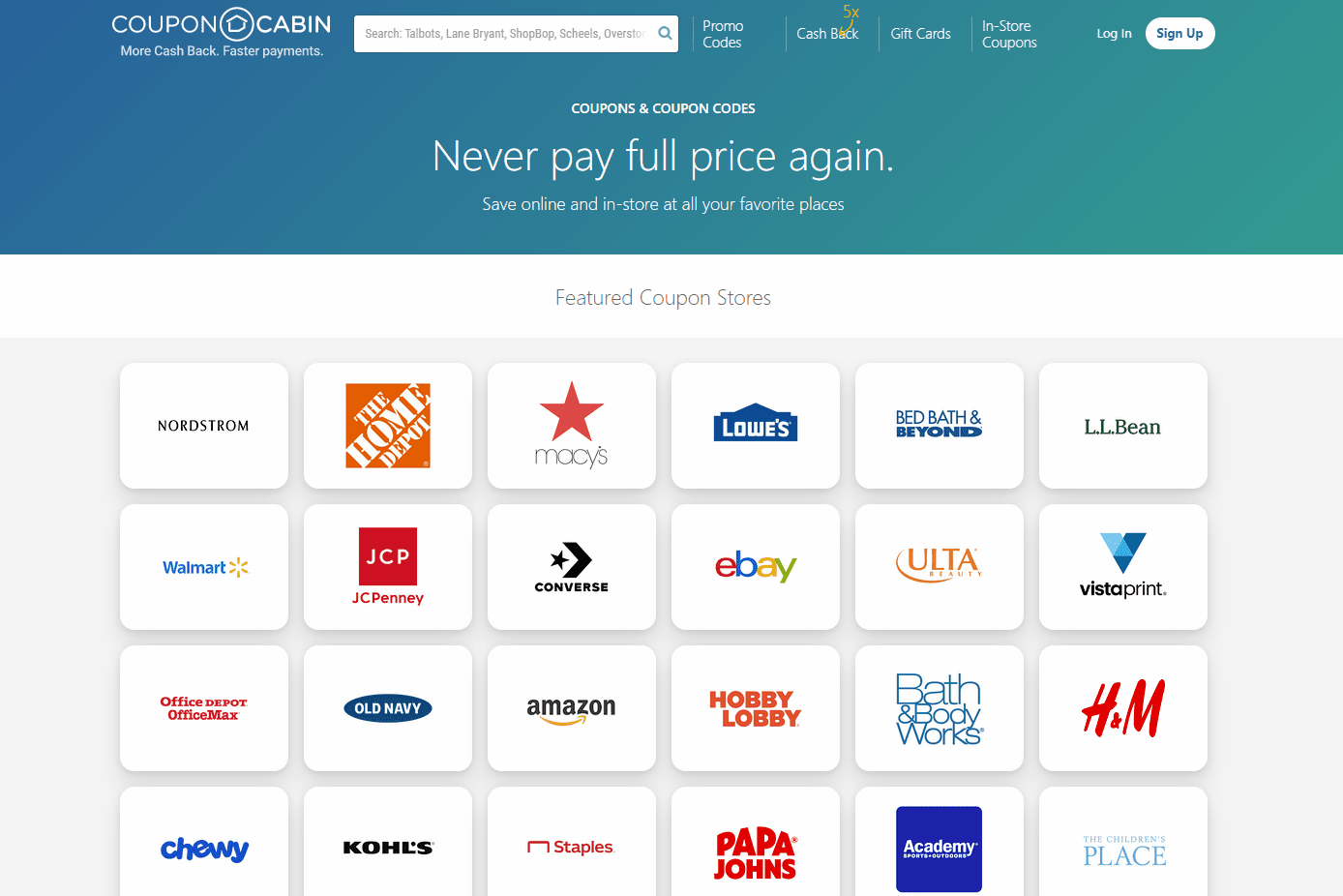How To Make An Online Coupon Website And Strategies For Success
Online coupon websites have become a staple in the digital shopping landscape, offering discounts and promotional deals to consumers looking to save money on their purchases. These platforms aggregate a wide range of coupons and deals from various retailers and service providers, making it easy for shoppers to find discounts on products and services they're interested in. Get the best tips and strategies to learn how to make an online coupon website.
Planning Your Coupon Website
Before diving into the technical aspects of creating an online coupon website, it's crucial to lay a solid foundation with careful planning. This stage will determine the direction and potential success of your venture. Here's how to plan your coupon website effectively and take advantage of the coupon culture in America, you can learn more on Money Saver Coupons.
Identifying Your Niche And Target Audience
Choosing a niche is the first step in planning your coupon website. A niche is a specialized market segment that caters to a particular group of people or type of product. By focusing on a niche, you can tailor your content to meet the specific needs of your audience, making your site more relevant and attractive to them.
To identify your niche, consider the following:
- Interests and passions: What industries or products are you passionate about? This can make the process more enjoyable and sustainable in the long run.
- Market demand: Is there a demand for coupons in your chosen niche? Use tools like Google Trends to analyze search patterns.
- Competition: How saturated is the market? It's often easier to succeed in a niche with fewer competitors.
Once you've chosen a niche, define your target audience. Understand their shopping habits, preferred platforms, and the types of deals they're looking for. This information will guide your content creation and marketing strategies.
Deciding On The Business Model And Monetization Strategy
Your business modeloutlines how your coupon website will generate revenue. There are several monetization strategies to consider:
- Affiliate marketing: Earn a commission for every sale made through your coupon links.
- Advertising: Display ads on your site and earn money based on views or clicks.
- Sponsored content: Charge businesses for featuring their deals or writing promotional content.
- Membership fees: Offer premium content or services to members for a fee.
Each model has its pros and cons, and you can combine multiple strategies for diversified income streams. It's important to choose a model that aligns with your niche and audience preferences.
Researching Competitors And Setting Your Unique Value Proposition
Understanding your competitors is key to differentiating your coupon website. Conduct thorough research to learn what they offer, their strengths, and areas where they fall short. Use this information to set your unique value proposition (UVP), which is a clear statement that describes the benefits of your site, how it solves customers' needs, and what distinguishes it from the competition.
To establish your UVP, consider the following:
- Exclusive deals: Can you offer coupons that aren't available elsewhere?
- User experience: How can you make your site easier to navigate and use than your competitors'?
- Community engagement: Can you build a community around your site that encourages user interaction and loyalty?
By carefully planning your coupon website, you set the stage for a successful online business. Identify your niche and target audience, decide on a monetization strategy that works for you, and research your competitors to carve out your unique space in the market. With these steps completed, you'll be ready to move on to building your coupon website.
Building Your Coupon Website
Once you have a clear plan for your online coupon website, including your niche, target audience, and monetization strategy, it's time to start building the actual site. This stage is crucial as it involves making decisions that will affect the functionality, user experience, and overall success of your coupon platform. Here are the key steps to take when constructing your coupon website.
Choosing A Domain Name And Hosting Provider
Selecting the Right Domain Name: Your domain name is your online identity. It should be:
- Memorable: Easy to remember so users can return without hassle.
- Relevant: Reflective of the coupon deals you offer.
- Short: The shorter, the better for ease of typing and recall.
- Brandable: Unique enough to stand out from competitors.
Finding a Hosting Provider:Your hosting provider is where your website lives on the internet. Consider these factors:
- Reliability: Look for 99.9% uptime guarantees.
- Speed: Faster hosting means a better user experience.
- Support: 24/7 customer support is essential.
- Scalability: Ability to upgrade as your website grows.
Selecting The Right Platform And Design For Your Site
Choosing a Platform:There are several platforms to choose from, each with its own pros and cons. Popular options include:
- WordPress: Highly customizable with a vast array of coupon-specific themes and plugins.
- Shopify: An e-commerce focused platform that can be adapted for coupon sites.
- Magento: A robust platform suitable for larger coupon sites with thousands of deals.
Designing Your Website:The design of your coupon website should be:
- User-Friendly: Easy navigation is key to keeping users on your site.
- Attractive: A visually appealing site can make a great first impression.
- Responsive: Your site must work well on mobile devices.
- Fast-Loading: Page speed is a critical factor for SEOand user experience.
Essential Features And Functionalities For A Coupon Website
Must-Have Features:Your coupon website should include:
- Search Functionality: Allows users to find deals quickly.
- Categories: Helps users browse deals by type or interest.
- Deal Expiry Dates: Shows users how much time they have to take advantage of offers.
- User Accounts: Lets users save favorite deals and receive personalized offers.
- Rating System: Users can rate deals, which helps others make informed decisions.
Additional Functionalities:To stand out, consider adding:
- Email Alerts: Notifies users when new deals are posted.
- Social Sharing Buttons: Makes it easy for users to share deals with friends.
- Comment Sections: Users can discuss the deals and share experiences.
- Mobile Optimization: Ensures a seamless experience on smartphones and tablets.
Building a coupon website involves careful consideration of various technical aspects, from choosing a domain name that resonates with your brand to selecting a hosting provider that ensures your site is always available and running smoothly. The platform and design of your site should not only be attractive but also user-friendly and optimized for search engines.
Lastly, incorporating essential features and functionalities will enhance the user experience and help your site stand out in the competitive world of online coupon deals. With these elements in place, you'll be well on your way to launching a successful coupon website.
Filling Your Site With Deals And Offers
Once you have your coupon website up and running, the next crucial step is to populate it with attractive deals and offers that will draw in users and keep them coming back for more. This part of the process is vital because a coupon website without deals is like a store with empty shelves. Here's how to ensure your site is filled with valuable content that will entice shoppers.
Partnering With Businesses And Affiliate Networks
To provide a wide range of deals, you'll need to establish partnerships with businesses and affiliate networks. Affiliate networks act as intermediaries between publishers (like you) and merchant affiliate programs. Here's how to get started:
- Join Affiliate Networks: Sign up for popular affiliate networks such as Commission Junction, ShareASale, or Rakuten Marketing. These platforms offer access to thousands of merchants who are looking to promote their products and services.
- Direct Partnerships: Reach out to businesses directly, especially local or niche-specific ones, to see if they would be interested in offering exclusive deals for your audience.
- Automated Deal Aggregators: Consider using automated tools that can help you pull in deals from various sources, saving you time and effort in curating content.
Curating And Organizing Deals Effectively
With access to a plethora of deals, the challenge now is to curate and organize them in a way that makes sense for your users. Here are some tips:
- Categorize Deals: Sort deals into categories based on type, industry, or popularity. This makes it easier for users to find what they're looking for.
- Update Regularly: Keep your content fresh by regularly updating deals. Remove expired offers and replace them with new ones.
- Highlight Popular Deals: Use analytics to determine which deals are most popular and feature them prominently on your site.
- User Experience: Ensure that the process of finding and using coupons is straightforward and hassle-free.
Legal Considerations And Compliance With Affiliate Disclosures
It's important to operate your coupon website within legal boundaries and to be transparent with your users. Here's what you need to keep in mind:
- Affiliate Disclosures: Be transparent about your use of affiliate links. The Federal Trade Commission (FTC) requires that you disclose your relationship with merchants when you stand to earn a commission from sales.
- Terms and Conditions: Clearly state the terms and conditions of using your website and the coupons you offer. This includes any limitations or exclusions that apply to the deals.
- Privacy Policy: Have a privacy policy in place that outlines how you collect, use, and protect user data.
By carefully selecting and organizing deals, and ensuring you comply with legal requirements, you can create a valuable resource for online shoppers. This will not only attract visitors to your site but also help you build a reputation as a reliable source for savings, which is essential for the growth and success of your online coupon website.
Marketing And Growing Your Coupon Website
Once you have your online coupon website up and running, filled with enticing deals and offers, the next crucial step is to attract visitors and convert them into loyal users. Effective marketing strategies are the cornerstone of any successful online business. Here are some tips and strategies to help you market and grow your coupon website.
SEO Strategies For Higher Visibility
Search Engine Optimization (SEO) is vital for ensuring your website ranks well on search engines like Google. Here's how to optimize your coupon website for search engines:
- Keyword Research: Identify the keywords that potential customers use when looking for coupons and deals online. Tools like Google Keyword Planner can help you find relevant keywords.
- On-Page SEO: Make sure each page on your site is optimized for search engines. This includes using keywords in your titles, headings, and throughout the content, as well as optimizing meta descriptions and images.
- Quality Content: Regularly publish high-quality, original content related to coupons, savings tips, and shopping advice. This not only helps with SEO but also provides value to your visitors.
- Backlinks: Build backlinks from reputable websites to increase your site's authority and improve search rankings. Guest posting on related blogs can be a good way to start.
- Mobile Optimization: Ensure your website is mobile-friendly, as a significant portion of users will access your site from mobile devices.
Utilizing Social Media And Email Marketing
Social media platforms are powerful tools for promoting your coupon website and engaging with your audience. Here are some ways to leverage social media:
- Create Profiles: Set up profiles on popular social networks like Facebook, Twitter, Instagram, and Pinterest. Tailor your content to each platform's audience.
- Share Deals: Regularly post about the latest deals and offers available on your website. Use attractive visuals and hashtags to increase reach.
- Engage with Followers: Respond to comments and messages promptly. Run contests and giveaways to encourage interaction and shares.
- Influencer Partnerships: Collaborate with influencers who can promote your website to their followers.
Email marketing is another effective channel for reaching out to your audience:
- Newsletter Sign-Up: Encourage visitors to sign up for your newsletter by offering exclusive deals or content.
- Personalized Emails: Send personalized emails with deals that match the recipient's interests. Use segmentation to tailor your messages.
- Regular Updates: Keep your subscribers informed about new coupons and special promotions.
Engaging With The Community And Building Customer Loyalty
Building a community around your coupon website can lead to higher engagement and customer loyalty. Here are some strategies to consider:
- Forums and Groups: Create a forum on your website or a group on social media where users can share deals and shopping tips.
- User-Generated Content: Encourage users to submit their own coupon finds. This not only provides more content for your site but also increases user investment.
- Loyalty Programs: Implement a loyalty program that rewards users for frequent visits, referrals, or contributions to the site.
- Customer Service: Provide excellent customer service to address any issues or questions that users may have. A positive experience can turn a one-time visitor into a regular user.
Best Html Templates For Coupon Websites
CouponHub Template
Home Page:
- Featured Coupons
- Trending Deals
- Search Bar
Coupon Categories:
- Electronics
- Fashion
- Travel
Single Coupon Page:
- Coupon Details
- Terms and Conditions
- Copy Code Button
About Us:
- Description of CouponHub
- Team Information
DiscountSaver Template
Homepage:
- Top Deals Carousel
- Latest Coupons
- Popular Stores
Categories:
- Beauty
- Home & Garden
- Food & Drink
Individual Store Page:
- Store Overview
- Active Coupons
- Related Stores
Contact Us:
- Contact Information
- Feedback Form
SavingsPro Template
Landing Page:
- Hero Section with Savings Message
- Featured Stores
- Newsletter Signup
Coupon Categories:
- Health & Wellness
- Tech & Gadgets
- Travel
Coupon Details Page:
- Coupon Information
- User Ratings and Reviews
- Share on Social Media
Privacy Policy:
- Information on Data Handling
- Cookie Policy
How To Make An Online Coupon - FAQs
How To Create A Coupon Code?
To create a coupon code, follow these general steps:
- Choose a Platform:Decide where you want to offer the coupon, whether it's on your own website, through a third-party platform, or in a physical store.
- Set Discount Parameters:Determine the type and amount of the discount (percentage off, fixed amount, buy-one-get-one, etc.).
- Generate Code:Use your platform's tools or an external service to generate a unique code.
- Set Expiry Date:If applicable, set an expiration date for the coupon.
- Promote:Once created, promote the coupon through your marketing channels.
Are Online Coupons Legal?
In general, online coupons are legal, but there are important considerations:
- Authenticity:Coupons should be legitimate and not fraudulent.
- Terms and Conditions:Clearly outline terms and conditions for coupon use.
- Expiration Dates:If applicable, adhere to expiration dates.
- Compliance:Ensure compliance with local laws and regulations.
- Manufacturer Guidelines:Adhere to any guidelines set by product manufacturers.
How To Get Coupon Code Online?
There are various ways to obtain coupon codes online:
- Official Websites:Check the official websites of brands, retailers, or services for promotions and exclusive codes.
- Newsletters:Subscribe to newsletters of your favorite stores as they often send out exclusive coupon codes to subscribers.
- Coupon Websites:Visit dedicated coupon websites that aggregate and share various discount codes.
- Social Media:Follow brands on social media platforms, as they may share codes or promotions with their followers.
- Cashback and Rewards Programs:Participate in cashback programs or loyalty schemes, as they often provide members with exclusive discounts.
Conclusion
By implementing these marketingand growth strategies, you can increase the visibility of your online coupon website, attract more visitors, and build a loyal community of users. Remember to monitor your results and adjust your tactics as needed to ensure continued success. With dedication and the right approach, your coupon website can become a go-to resource for shoppers looking to save money.


